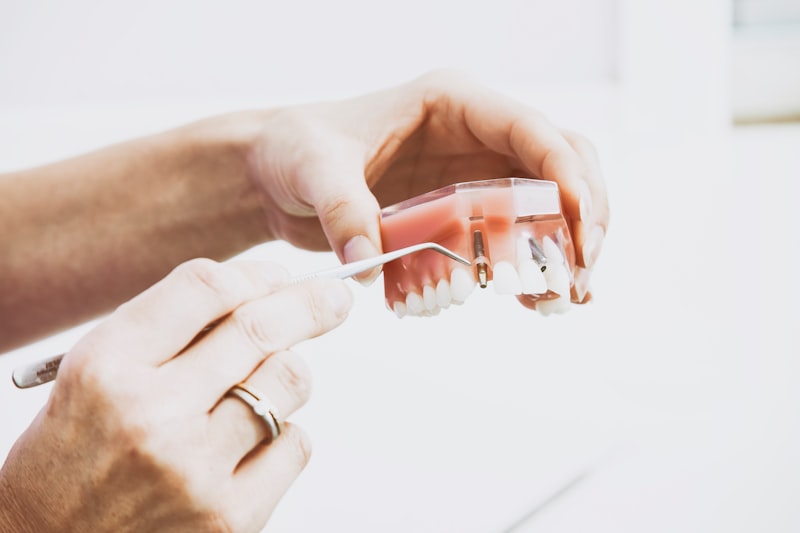Firstly, consider your primary oral health concerns. Are you looking to combat plaque buildup, prevent cavities, or alleviate gum inflammation? Different mouthwashes address these issues with specialized formulations. For instance, fluoride mouthwashes strengthen tooth enamel and help prevent tooth decay, making them ideal for those prone to cavities.
If gum health is your focus, an antibacterial mouthwash containing chlorhexidine or essential oils like tea tree oil can effectively reduce plaque and gingivitis. These ingredients inhibit bacterial growth, promoting healthier gums over time. Conversely, alcohol-free options are gentler and less likely to cause dryness or irritation, making them suitable for individuals with sensitive gums or dry mouth conditions.
For those seeking a versatile solution, multipurpose mouthwashes offer combined benefits such as plaque control, cavity prevention, and breath freshening in one product. Look for labels that specify these attributes to ensure you’re getting the comprehensive care you need.
When selecting a mouthwash, it’s also crucial to consider any specific dental recommendations or prescriptions from your dentist. They can provide tailored advice based on your oral health history and current needs, ensuring optimal results.
Ultimately, the right mouthwash enhances your oral care regimen by targeting your unique concerns effectively. By choosing wisely and incorporating it into your daily routine, you can achieve a healthier mouth with fresher breath and stronger teeth and gums.
Fresh Breath Guaranteed: How to Choose the Best Mouthwash for You
Before selecting a mouthwash, consider what you hope to achieve. Are you looking for fresher breath, stronger enamel, or protection against cavities? Different mouthwashes cater to different needs, so identifying yours will narrow down your choices.

Antiseptic Mouthwashes: These are designed to kill bacteria and freshen breath. They often contain ingredients like chlorhexidine or essential oils like eucalyptus or tea tree oil. Ideal for those prone to gum disease or bad breath.
-
Fluoride Mouthwashes: These strengthen enamel and help prevent tooth decay. Fluoride is a key ingredient in protecting against cavities and remineralizing teeth. Recommended for individuals with a high risk of cavities.
-
Cosmetic Mouthwashes: These focus primarily on freshening breath and may not offer additional oral health benefits like cavity protection or gum care. They’re great for a quick refresh but may not address underlying oral health issues.
-
Sensitive Teeth: If you have sensitive teeth or gums, opt for a mild mouthwash without alcohol or harsh chemicals.
-
Children: Mouthwashes formulated for children are typically alcohol-free and have milder flavors. Always check the age recommendations and supervise their use.
When selecting a mouthwash, look for the American Dental Association (ADA) Seal of Acceptance. This ensures the product has been rigorously tested for safety and effectiveness. Additionally, read the labels for specific benefits and usage instructions.
-
Follow Instructions: Always use the mouthwash as directed. Some require dilution, while others recommend a specific duration for rinsing.
-
Consistency: Incorporate mouthwash into your daily oral care routine for best results. It complements brushing and flossing by reaching areas that may be missed.
By choosing the right mouthwash, you can enhance your oral hygiene regimen and enjoy fresher breath with confidence. Whether you prioritize cavity prevention, gum health, or simply a minty fresh feeling, there’s a mouthwash out there tailored to meet your needs. Explore your options, consult your dentist if needed, and find the perfect fit for a healthier smile.
Your Guide to Minty Freshness: Selecting the Perfect Mouthwash
Looking to step up your oral hygiene game? Choosing the right mouthwash can make a significant difference in achieving that minty fresh feeling and maintaining overall oral health. With so many options available on the market today, finding the perfect mouthwash tailored to your needs can seem daunting. Let’s break down what you need to know to find your ideal match.
Firstly, consider your specific oral health needs. Are you prone to cavities? Do you struggle with bad breath? Different mouthwashes offer unique benefits such as fluoride for cavity protection or antibacterial agents to combat bad breath and plaque buildup. Understanding your oral health goals will guide you towards the most effective formulation.
Next, think about sensitivity. If you have sensitive teeth or gums, opt for a gentle formula that soothes rather than irritates. Look for keywords like “gentle” or “sensitive” on the label.
Flavor plays a crucial role in mouthwash satisfaction. From classic mint to more adventurous flavors like cinnamon or citrus, the right taste can enhance your overall experience and encourage regular use. Remember, you’re more likely to stick with a mouthwash that you enjoy using daily.
Ease of use is another factor to consider. Some mouthwashes come with convenient features like built-in measuring cups or pump dispensers, making them easier to incorporate into your daily routine.
Lastly, always check for the ADA (American Dental Association) Seal of Acceptance. This indicates that the product has been rigorously tested for safety and effectiveness, giving you peace of mind in your choice.
By considering these factors – your oral health needs, sensitivity, flavor preference, ease of use, and ADA approval – you’ll be well on your way to finding the perfect mouthwash that not only freshens your breath but also supports your overall oral hygiene regimen.
Beyond Freshness: What to Look for When Choosing Mouthwash
Firstly, check the label for key components like fluoride. This mineral is crucial for strengthening tooth enamel and preventing cavities. It’s particularly beneficial if you’re prone to dental decay or have weakened enamel.
Next, consider the alcohol content. While alcohol can provide that immediate clean feeling, it may also dry out your mouth over time, leading to potential discomfort. Opting for an alcohol-free formula can be gentler on sensitive gums and oral tissues.
Look for antibacterial properties, especially if you’re aiming to combat gum disease or bad breath. Ingredients like chlorhexidine or essential oils such as tea tree and eucalyptus can effectively kill bacteria and reduce plaque buildup between dental visits.
Furthermore, if you have specific oral health concerns such as sensitivity or enamel erosion, choose a mouthwash that addresses these issues. Some formulas are designed to provide relief from sensitivity or to remineralize enamel, offering targeted care beyond basic freshness.
Consider the taste and texture too. Mouthwash should be enjoyable to use daily, encouraging consistent oral hygiene habits. Whether you prefer a mild, subtle flavor or a stronger, invigorating taste, finding one that suits your palate can make a difference in how often you use it.
Lastly, think about your overall oral care routine. Mouthwash should complement your brushing and flossing habits, enhancing rather than substituting for them. It should fit seamlessly into your daily regimen, promoting long-term oral health benefits.
From Antiseptic to Whitening: Finding the Ideal Mouthwash for Your Needs
Antiseptic mouthwashes are like the frontline soldiers in your oral hygiene arsenal. They contain active ingredients such as chlorhexidine or cetylpyridinium chloride, which are effective in killing bacteria that cause plaque and gum disease. Using an antiseptic mouthwash can significantly reduce plaque buildup and maintain healthier gums, making it ideal for those prone to dental issues.
For those who struggle with bad breath, or halitosis, therapeutic mouthwashes are designed to neutralize odor-causing compounds rather than just masking them. Ingredients like eucalyptol, menthol, and thymol work together to freshen breath and leave your mouth feeling clean and revitalized throughout the day.
If you’re focused on achieving a brighter smile, consider using a whitening mouthwash. These products often contain hydrogen peroxide or carbamide peroxide, which help remove surface stains on teeth caused by coffee, tea, or smoking. While not as potent as professional whitening treatments, they can enhance the brightness of your smile over time when used consistently.
For individuals with sensitive teeth and gums, alcohol-free mouthwashes offer a gentler alternative. They are formulated to provide similar benefits without the burning sensation that alcohol-based products may cause. Look for soothing ingredients like aloe vera or chamomile to help calm irritation while still maintaining oral hygiene.
The ideal mouthwash for you depends on your specific oral health needs. Whether you’re combating bacteria, freshening breath, whitening teeth, or soothing sensitivity, there’s a mouthwash designed to address your concerns effectively. By choosing the right product and incorporating it into your daily routine, you can enhance your oral hygiene and overall dental health.
Sensitive Gums? Choosing a Gentle Mouthwash That Works
Imagine this: your gums, like delicate petals, needing just the right care to flourish. That’s where gentle mouthwashes come into play. They’re designed with soothing ingredients that won’t aggravate sensitive gums. Instead, they provide a calming effect, almost like a gentle breeze on a hot day.
But what exactly should you look for in a gentle mouthwash? First and foremost, check the ingredients. Avoid alcohol-based formulas, as they can be too harsh. Instead, opt for mouthwashes that boast ingredients like aloe vera or chamomile. These natural extracts are known for their soothing properties, perfect for tender gums in need of some TLC.
Next, consider the formulation. Look for mouthwashes that are specifically labeled for sensitive gums. They’re formulated to be milder, yet effective in freshening your breath and maintaining oral hygiene. Think of it as a tailored suit for your gums—snug, comfortable, and just right.
When incorporating a gentle mouthwash into your routine, consistency is key. Use it after brushing and flossing to complete your oral care regimen. This helps ensure that any lingering bacteria are dealt with gently, without causing further irritation.
So, whether you’re prone to sensitivity or simply prefer a gentler approach to oral care, choosing a mouthwash designed for sensitive gums can be a game-changer. It’s like giving your gums a spa day—relaxing, rejuvenating, and leaving you with a fresh, clean feeling you’ll love.
The Science of Mouthwash: Ingredients That Make a Difference
One of the key ingredients in mouthwash formulations is fluoride. Known for its ability to strengthen tooth enamel, fluoride helps protect teeth from decay and cavities. It works by remineralizing enamel, making teeth more resistant to acid attacks from plaque bacteria and sugars in the mouth.

Another essential component is antibacterial agents like cetylpyridinium chloride (CPC) or chlorhexidine. These ingredients fight against bacteria that cause plaque and gum disease, reducing bacterial growth and promoting healthier gums. They work by disrupting bacterial cell membranes, inhibiting their ability to multiply and causing them to die off.
To enhance its cleansing power, mouthwash often contains surfactants such as sodium lauryl sulfate (SLS). Surfactants help to disperse and loosen plaque and debris from the teeth and gums, ensuring a thorough clean with every swish.
Astringents like witch hazel or alcohol are included in some mouthwashes for their ability to constrict blood vessels and reduce gum bleeding. They also provide a refreshing sensation that many users find invigorating.
Additionally, mouthwash may contain flavors and sweeteners to improve taste and make the oral care routine more enjoyable. These ingredients not only mask the medicinal taste of active agents but also encourage regular use, contributing to overall oral health maintenance.
The science of mouthwash is a delicate balance of active ingredients aimed at achieving optimal oral hygiene. By understanding the roles of fluoride, antibacterial agents, surfactants, astringents, and flavorings, users can choose a mouthwash that best suits their specific oral health needs, ensuring a fresh and healthy smile every day.
Frequently Asked Questions
What ingredients should I look for in a mouthwash for specific oral health needs?
Learn about selecting mouthwash based on specific oral health needs. Look for fluoride to prevent cavities, essential oils like eucalyptus or thymol for reducing plaque and gingivitis, and alcohol-free formulas for sensitive gums. Each ingredient targets different aspects of oral health.
What types of mouthwash are available, and which one should I choose?
Discover the types of mouthwash available and find the right one for your needs with our concise guide. Learn about different formulations such as fluoride, antibacterial, and alcohol-free options, and choose based on your oral health goals.
Are there mouthwashes recommended for sensitive teeth or gum problems?
Discover mouthwashes tailored for sensitive teeth and gum issues with our recommended selections. These formulations are designed to provide relief and promote oral health, addressing specific concerns effectively.
How often should I use mouthwash, and can it replace brushing and flossing?
Learn how often to use mouthwash and whether it can substitute brushing and flossing in this concise FAQ. Discover the ideal frequency for mouthwash usage and its role compared to brushing and flossing.
Can mouthwash prevent bad breath, and how effective is it compared to other oral hygiene products?
Discover if mouthwash effectively prevents bad breath and its effectiveness compared to other oral hygiene products.


